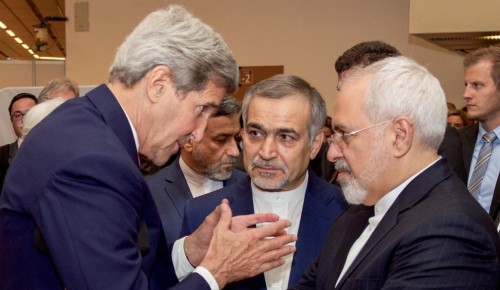PHOTO: US Secretary of State John Kerry and Iranian Foreign Minister Mohammad Javad Zarif, October 2015
Iran has lashed out at US Secretary of State John Kerry over the issue of ongoing American financial restrictions, despite the implementation of the July 2015 nuclear deal.
Kerry said on Friday that the US was trying to solve the slow renewal of finance and banking links with Iran — notably the refusal of European firms to re-establish business because of the fear of American punishment — but that Iran’s “regional activities” and testing of ballistic missiles “hugely complicates efforts to move forward rapidly”.
Deputy Foreign Minister Abbas Araqchi, who heads the Iranian committee on implementation, said on Saturday that while Iran’s on using the benefits of the nuclear agreement is good, “at the same time there are hindrances, some of which arise from the other parties’ procrastination”. He asserted that the reluctance on the part of “certain countries” to fulfil implementation is being investigated.
On Sunday, Araqchi went farther in the criticism, specially naming the US Secretary of State, “John Kerry’s remarks are nothing but an excuse for the US to avoid carrying its JCPOA [Joint Comprehensive Plan of Action] commitments.”
Araqchi said Kerry’s remarks are “absolutely wrong and incorrect” becuase of the US refusal to grant Tehran access to financial, banking, technology, and commerce markets, even though “in the JCPOA, they accepted to avoid carrying out any action which would hinder the normalization of commercial and banking ties with Iran”.
The Obama Administration has said that, despite an agreement reached after more than a decade of dispute over Iran’s nuclear program, Tehran will not be allowed into US financial markets.
However, the Islamic Republic’s priority is trying to get into non-US markets around the world, with Europe a particular focus.
Although Kerry has said throughout the summer — including in a meeting in London — that the US does not want to block the renewal of European business, Iran has struggled to re-establish links. A January deal with France’s Airbus for 118 civilian aircraft has been hindered in completion — the French firm finally announced last month that the first delivery of 18 planes would be made in 2017.
Deals worth billions of dollars, also announced since January, have also not materialized. In addition to the complications of US sanctions, European firms have faced Iranian regulations and in-fighting, with groups like the Revolutionary Guards wary of outside investment.
The disputes have even hindered Iran’s energy sector, despite a 40% recovery in oil production and exports since January. Iran and foreign firms are still discussing the terms of a new Iran Petroleum Contract reframing outside investment.

